After 23 years, this beloved Highland Park elotero is moving to Mexico to be with his true love
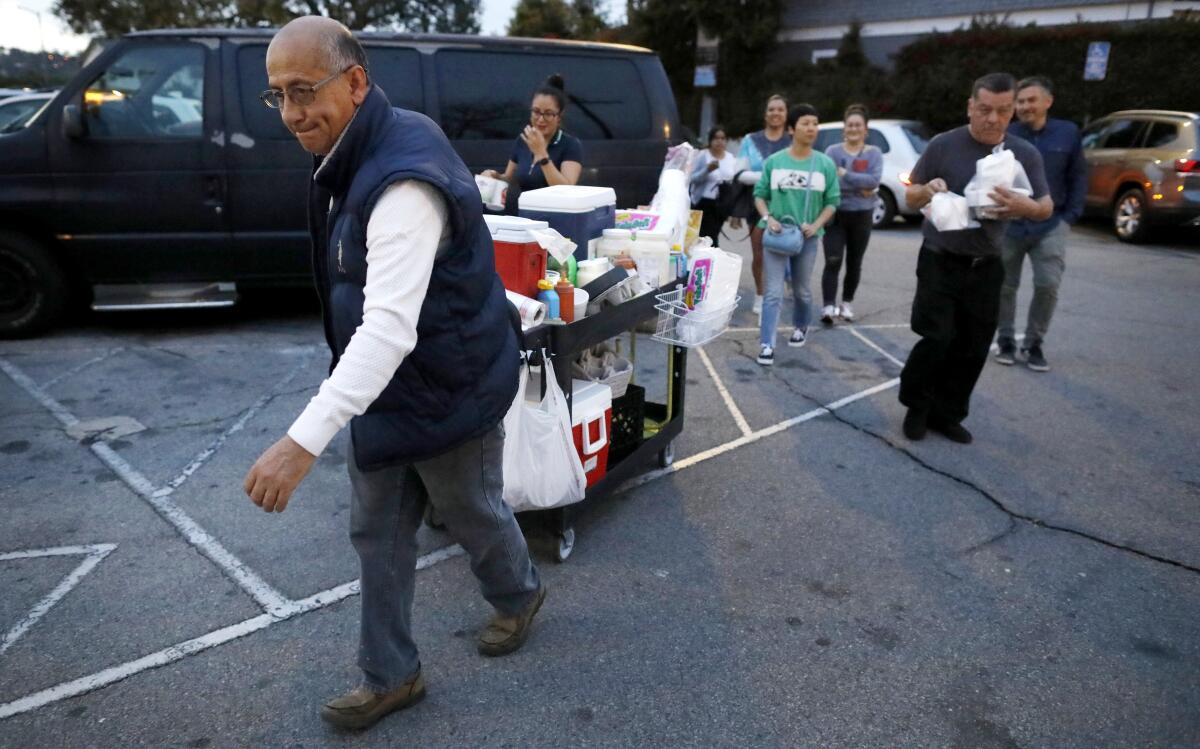
- Share via
For the last two decades, Andres Santos’ life revolved around corn.
Each day, he woke before sunrise and spent his early hours shucking, chopping and cleaning dozens of ears of corn in a friend’s backyard. Afternoons were spent boiling them in industrial-sized pots in his cramped studio apartment.
By nightfall, he loaded his 300-pound cart — carrying big tubs of mayo, bags of cotija cheese, bottles of lime juice and powdered chili — into a van and drove to the corner of Avenue 57 and Figueroa Street in Highland Park. There, he stood for hours, selling corn on the cob and cups of esquites, a buttery soup of kernels and spicy ingredients.
He had legions of hungry devotees. But after 23 years, the humble elotero, or corn man, of Highland Park has hawked his final kernel. Santos, 59, “retired” last month and headed home to Mexico to chase that grandest dream of all: love.
He plans to marry his long-distance girlfriend in his homeland and start another food business.
“It’s not my intention to come back,” Santos said. “I am going with the idea of accomplishing the Mexican dream.”
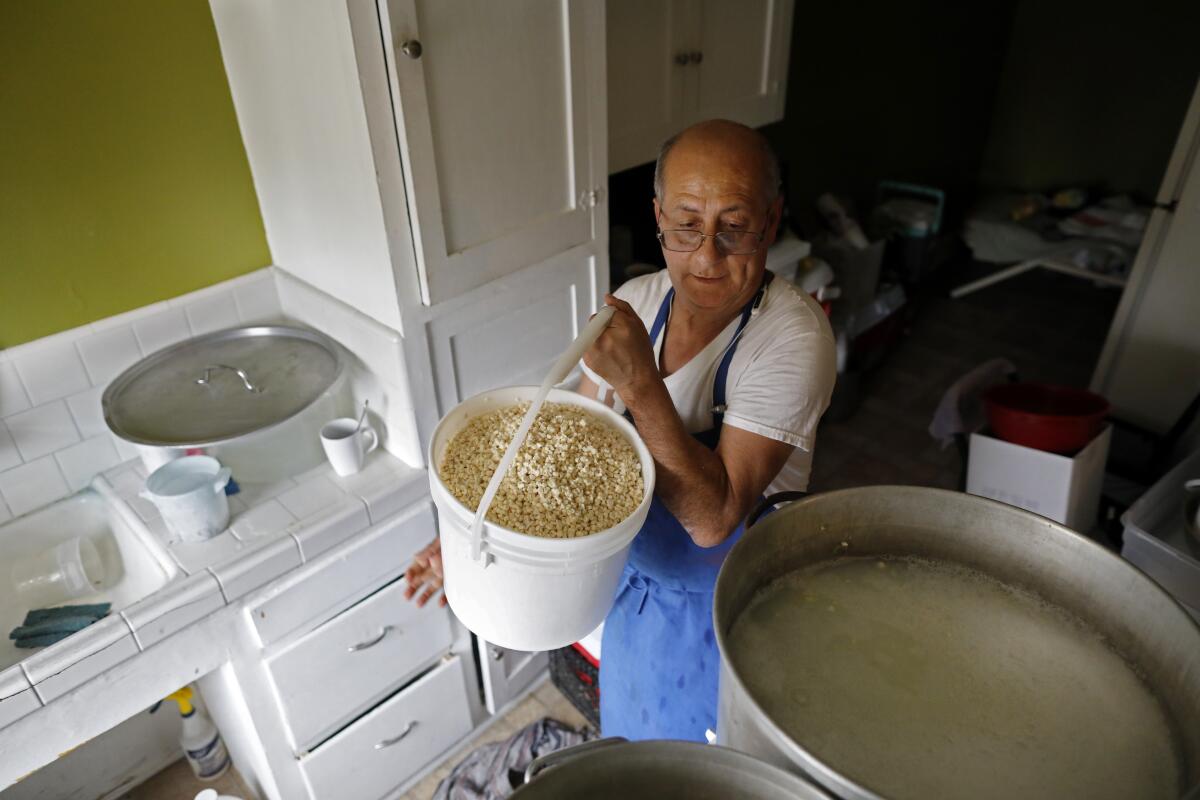
Though Santos said he’s grateful for the opportunities this country and its people have given him, success always seems a few steps ahead of him.
“I felt like a donkey chasing a carrot hanging from a string,” he said. “You never reach the carrot.”
The last few years, his meager profits have been halved as Highland Park has undergone dramatic changes that made the former working-class Latino neighborhood synonymous with gentrification. He said he lost his sense of belonging as an influx of wealthier white residents replaced Latinos.

And yet, the corn man’s final night in Highland Park felt like a retirement party for a celebrity. That night he would learn the community had not forgotten him.
Hawking corn certainly wasn’t the life Santos, a bespectacled man with thinning salt-and-pepper hair, ever envisioned. He was a college graduate whose family owned a mini market in the central Mexican state of Morelos.
In 1997, Santos left his hometown, fleeing an economic crisis that hit the family market hard. His young daughter and her mother followed.
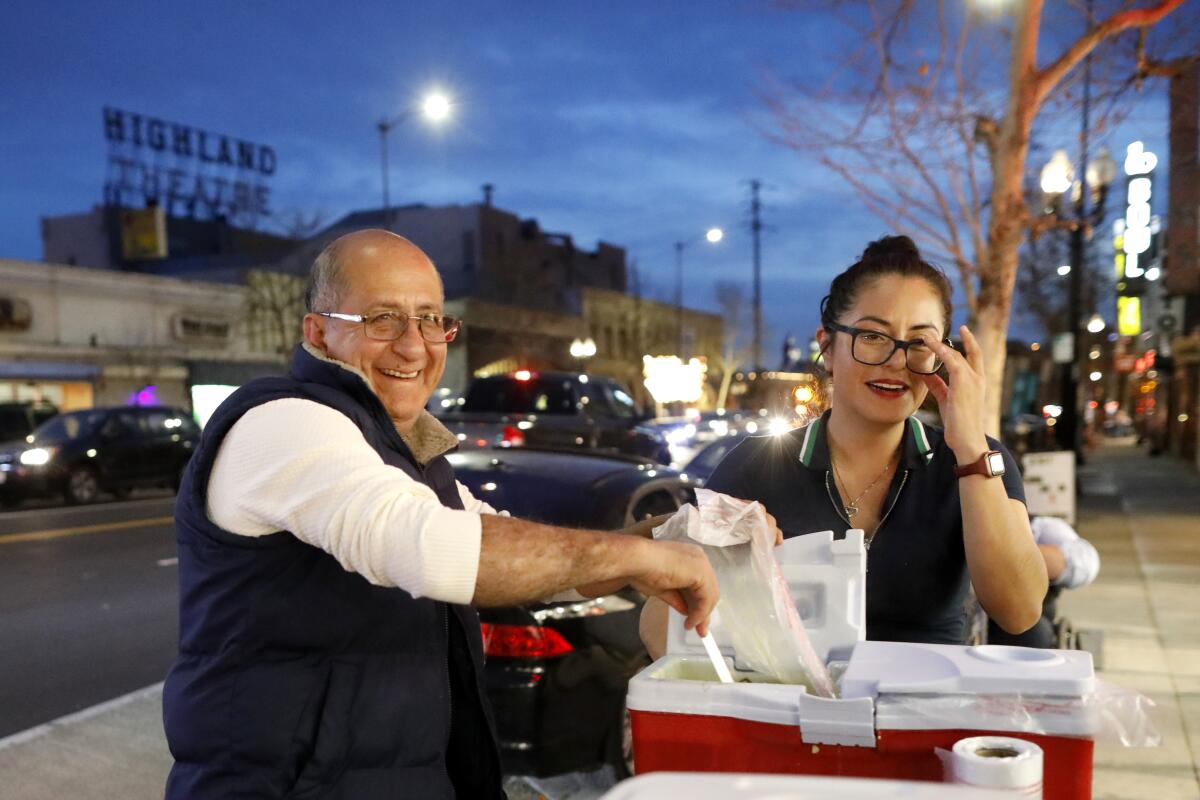
In Highland Park, Santos followed the footsteps of his father, who had come to the U.S. in the late 1980s and scraped by, selling corn and raspados, shaved ice, in the neighborhood. His father, Isidro Santos Franco, died of a heart attack at 63 while handing two little girls cups of shaved ice in front of San Pascual Elementary School.
Santos recalled how, when he was still in Mexico, he was baffled by his father’s decision to be a corn man. He had asked, “How could you sell raspados and elotes in the U.S.?”
But when he moved to Highland Park, Santos realized his father was on to something.
“It was an extension of our pueblos, of our Mexico,” he said. “I didn’t feel like a foreigner.”
For years, Santos had no trouble selling the cobs and esquites, with customers so plentiful. There were several successful eloteros like him. His days ended around 8 p.m.
But eventually, he started noticing that Latino-owned businesses were disappearing. They blamed raising rents.
Then the other eloteros moved on too. “They didn’t see a market here anymore, and they went to other places,” he said. “Mi raza, mis paisanos, they had to leave for a new cycle of life, and Americans arrived, taking their spots.”
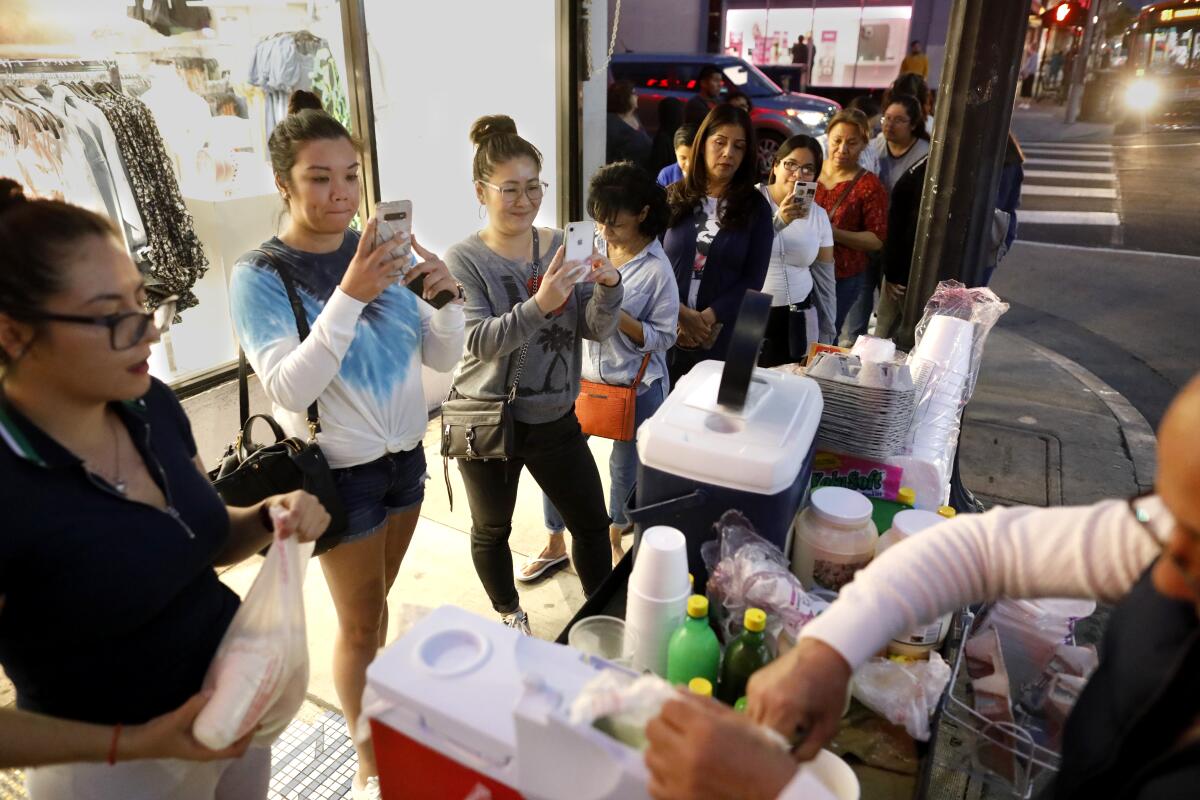
Santos tried to keep up with the changes. He shifted his hours, ending his days at 10 p.m. as nightlife boomed. He briefly attempted a new system that allowed him to take credit card payments. He made social media accounts.
Nothing seemed to help. He relied on an increasingly small number of loyal, mostly Latino customers for his earnings of about $180 a night, just enough to afford his $850-a-month apartment.
And then there were the street vending bans. Around 2008, Santos found himself targeted by a nearby business owner who reported him to Los Angeles authorities. Police officers, who had never bothered him before, arrested him, and he spent two nights in jail. After that, he stopped selling corn for a while.
“It was something that was traumatic, because in my whole life, I had never been in that situation,” he said. “I felt very bad. Depressed, humiliated.”
But eventually, he returned to Avenue 57 and Figueroa. In the years since, L.A. has come to view street vending in a different way. In 2018, it was officially legalized after years of contentious debate.
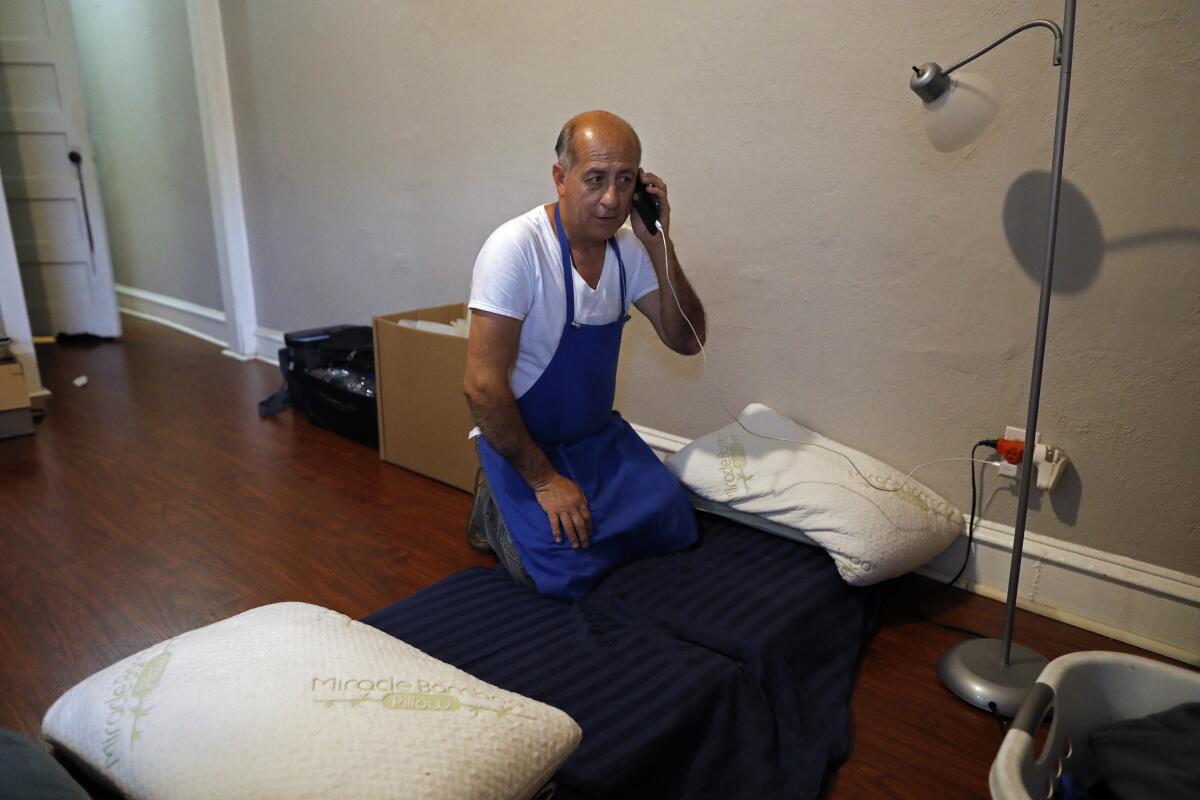
Four years ago, Santos separated from his daughter’s mother, and he received an unexpected Facebook friend request from a long-ago love, his college girlfriend, Norma. They had dated three decades ago, but he had put his work first and they both moved on.
They rekindled their romance from afar. Norma visited him every few months, but he could never risk traveling to see her in Mexico because he was living in the country illegally.
“I did feel weird,” he said. “After 33 years, can you imagine, to see someone who you tried with and was your girlfriend? But it was nice.”
They plan to marry within a few months.
The night before his last day selling in Highland Park, Santos — who usually prepped 150 to 180 ears of corn a day — prepared about 400. A Facebook post announcing his plans to leave had gone viral, and he ran out of corn that night, leaving a long line of customers without food.
He didn’t want to disappoint them again, so he woke that last day at 4 a.m., this time prepping nearly 600 ears of corn to make esquites, his hands moving swiftly, chopping the ends of each ear of corn before undressing it and brushing it clean. He took a break only to get his hair cut.
“I have to look presentable,” he said.
That evening, within minutes of arriving at an Avenue 57 parking lot with his daughter, Andrea Santos, he was surrounded by customers.
In foam cups, he plopped three scoops of corn kernels in broth and added mayo, a splash of butter, four spoonfuls of cotija cheese, a dash of chili and a squirt of lime juice. Andrea worked in unison, preparing plastic bags, utensils and cups and taking customers’ cash. All the while, Santos was showered in compliments, well wishes and honks from the road.
A representative for Los Angeles Mayor Eric Garcetti’s office handed him a commendation, embossed with the city’s seal: “Thank you for providing the Highland Park community with delicious elotes for 23 years. We wish you all the best in the new chapter of your life.”
There were selfies and hugs. TV cameras rolled and fans chanted, “Four more years! Four more years!”

“It makes me sad that you’re leaving,” said Jorge Quezada, a Highland Park resident. He asked Santos about his “secret recipe,” to which Santos replied: epazote and chicken broth powder.
On the crowded sidewalk, people squeezed by to get past Santos’ line. Some slowed their step to take a peek at Santos’ cart, curious about what could possibly be drawing such a large crowd.
“Is this new?” one woman asked before walking away.
“It must be good,” said a man dressed in a crisp white shirt. He walked off too.
“It’s funny, while I was standing in line, you see all these hipsters walking by,” Quezada said, clutching a bag of esquites. “Kind of snooty, kind of like looking down a bit, like, ‘Why are they buying food from the street?’”
“A neighborhood like this, you have to share,” he added. “I don’t think the hipsters are there yet. For them to see so many Latinos, it’s impeding on their world.”
Daisy Orozco-Meeker, 28, had been standing in line but was hearing whispers that Santos had run out already. With her friends holding her place, she went to the front of the line to find out if it was true and to leave a tip in case she couldn’t buy anything. She also figured she could ask him what cheese he used, because she had always wondered.
“He just turned around and he gave it to me,” said Orozco-Meeker, who has been eating Santos’ esquites since she was a child.
Before leaving, she and her friends found a Sharpie and asked him to sign the bag. When he realized she wanted his autograph, Santos grinned.
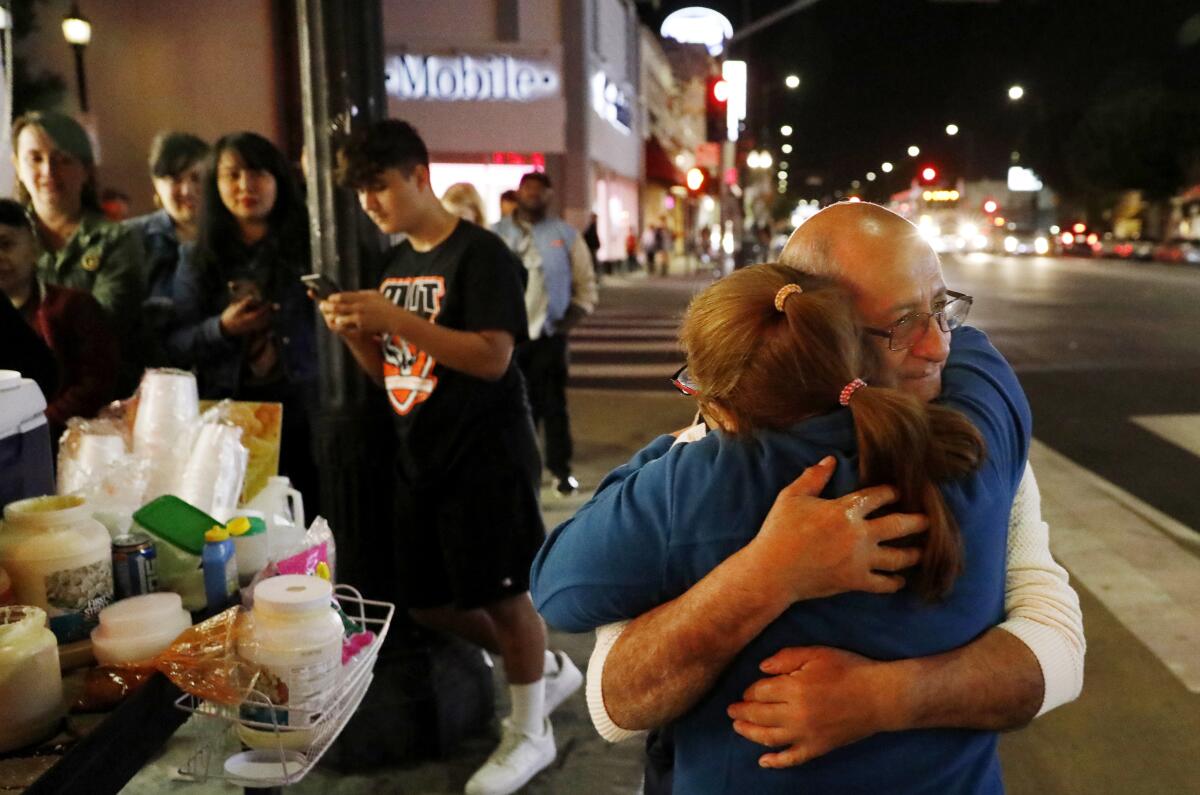
“I’m going to save this,” Orozco-Meeker said, “and I’m going to frame it.”
After Santos ran out of food — with people still in line — many stayed to thank him, hug him, shake his hand. Cars stopped by the curb, asking if they could still order.
“You’re too late,” he told them apologetically.
For a moment, realizing what one viral moment did for his business, Santos entertained the idea of staying. Maybe if he did things a little differently and took advantage of social media, all his nights could look like this. Maybe, he thought, it could work.
But then he thought of Norma. He laughed.
“No, that woman would hang me,” he said. “I can’t do this to her again.”
More to Read
Sign up for Essential California
The most important California stories and recommendations in your inbox every morning.
You may occasionally receive promotional content from the Los Angeles Times.









